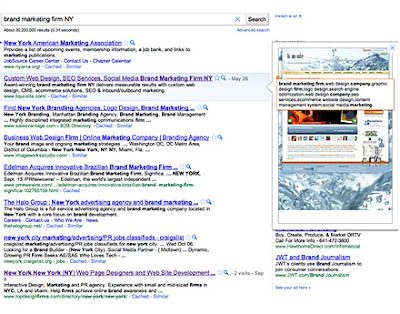Seems like Google’s testing and launching something new every day. Do these people ever sleep? As of today, the newest feature is called Google Magnifying Glass Page Previews. And just like everything that’s released by this online giant, there are obvious pro’s and con’s to their latest and greatest.
What and Where Are Google Magnifying Glass Page Previews?
You’ll begin to see small magnifying glass icons next to each item that appears within your Google search results page. It appears that you must be logged into your Google account in order to see the magnifying glasses, and that will likely be visible soon to searchers who are not logged in as well. But, that’s never a guarantee with Google.
What Does This Mean For Your Next Search?
If you’re logged into Google, you’ll see these icons and have the ability to hover over them in order to see a snapshot of the website you’re thinking about visiting. Pretty cool, huh? Well, Google has taken this one step further to highlight the text in the original search query. From a design perspective, it’s not exactly pretty.
 |
| www.liqui-site.com on Page 1 for “brand marketing NY” |
You’re not getting a “real screenshot” of what the prospective click-thru may look like when you arrive there, but you get the overall sense of what the homepage looks like.
CNET’s Tom Krazit adds that “Google searchers can already refine their searches to generate results with page previews through the “search options” panel on the left-hand side of the search results page, but those previews are much smaller and aren’t automatically generated by a hover, like the ones spotted first by Patrick Altoft today. Search Engine Land notes that Ask.com and Microsoft’s Bing have offered similar preview options in the past.”
What This Means For Your Website
If your homepage doesn’t make a good first impression now, prospects can now make the decision to click or not to click – without actually clicking anything. That means that your overall site traffic may change for better or for worse, but your bounce rate (the percentage of people who decide your site wasn’t relevant to their search and leave immediately) may decrease because the prospect has already decided that your site now “looks” like something relevant to their search. And that’s a good thing! We’ll keep an eye on statistics to see if this theory plays out.
